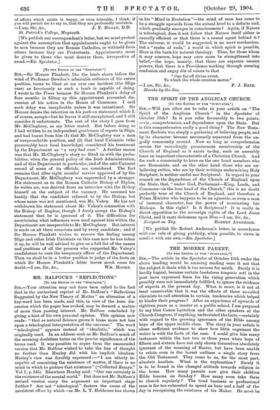Sin,—Your attention may not have been called to the fact
that in the authorised reprint of Mr. Balfour's "Reflections Suggested by the New Theory of Matter" an alteration of a key-word has been made, and this, in view of the keen dis- cussion which the paper has evoked, may be deemed a matter of more than passing interest. Mr. Balfour concluded by giving a hint of his own personal opinion. This opinion now reads : " that as natural Science grows it leans more not less upon a teleological interpretation of the universe." The word " teleological" appears instead of " idealistic," which was originally used. In an address such as Mr. Balfour's much of the meaning doubtless turns on the precise significance of the terms used. It was possible to argue from the unamended version that Mr. Balfour wished to take the line of thought no further than Huxley did with his implicit idealism. Huxley's view was forcibly expressed I am utterly in- capable of conceiving the existence of matter, if there is no mind in which to picture that existence" ("Collected Essays," Vol. I., p. 245). Elsewhere Huxley said: "Our one certainty is the existence of the mental world." But does not Mr. Balfour's revised version carry the argument an important stage further P Are not " teleological " factors the cause of the Persistent effort by which—as Mr. L. T. Hobhouse has shown in his "Mind in Evolution "—the mind of man has come to be a struggle upwards from the animal level to a definite end, which gradually emerges in consciousness ? Again, if Nature is teleological, does it not follow that Nature itself either is causally efficient or that there is a causal agent behind it P The universe, it would be suggested, is no mere mechanism. but a "realm of ends," a world in which spirit is possible, Here is the basis for natural theology. Thus, for those whom it may concern, hope may once more be strengthened into belief,—the hope, namely, that there are supreme unseen powers, that there is a Providence working through seeming confusion and angry din of voices to that
" One far-off divine event, To which the whole creation moves."
—I am, Sir, &c., P. J. REID. Marske-by-the-Sea.


















































 Previous page
Previous page